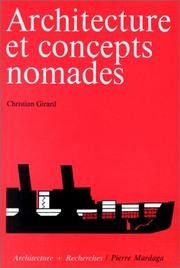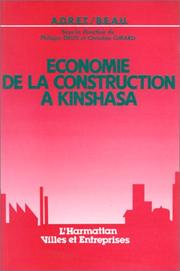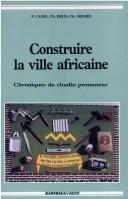| Listing 1 - 10 of 14 | << page >> |
Sort by
|

ISBN: 2870092598 9782870092590 Year: 1986 Volume: 26 Publisher: Bruxelles Mardaga
Abstract | Keywords | Export | Availability | Bookmark
 Loading...
Loading...Choose an application
- Reference Manager
- EndNote
- RefWorks (Direct export to RefWorks)
Architecture --- architectural theory --- architectuur --- architecture [discipline] --- Bouwkunst --- Symbolism in architecture. --- Symbolisme en architecture --- Philosophy. --- Philosophie --- Symbolism in architecture --- Architecturologie --- Epistémologie --- Théorie de l'architecture --- Philosophy --- Eisenman, Peter --- Gregotti, Vittorio --- Kahn, Louis Isidore --- Le Corbusier --- Traité d'architecture --- Esthétique --- Théorie --- -Symbolism in architecture --- Architectural symbolism --- Signs and symbols in architecture --- Architecture, Western (Western countries) --- Building design --- Buildings --- Construction --- Western architecture (Western countries) --- Art --- Building --- Design and construction --- -Symbolism in architecture. --- Kahn, Louis Isidore, --- Le Corbusier, --- Symbolisme en architecture. --- Esthétique. --- Philosophie. --- Le Corbusier, Charles-Edouard Jeanneret, --- Eisenman, Peter, --- CDL --- 72.01 --- Architecture - Philosophy --- Eisenman, Peter, 1932 --- -Gregotti, Vittorio --- Kahn, Louis Isidore, 1901-1974 --- Le Corbusier, Charles-Edouard Jeanneret, 1887-1965 --- Traité d'architecture --- Esthétique --- Théorie
Book
ISBN: 9782711630684 2711630684 2711630684 Year: 2023 Publisher: 80-Abbeville cedex: Paris: Impr. Imprimerie F. Paillart, Librairie Philosophique J. Vrin,
Abstract | Keywords | Export | Availability | Bookmark
 Loading...
Loading...Choose an application
- Reference Manager
- EndNote
- RefWorks (Direct export to RefWorks)
La question du « nous » révèle de manière exemplaire toutes les tensions qui traversent la philosophie de Plotin, entre l’âme et le corps, entre l’intellect et la réalité sensible, entre le monisme et le dualisme. Dans cette étude, l’auteur montre que Plotin ne se contente pas de dérouler une définition préconçue et immuable de l’homme, héritée de la tradition platonicienne, mais que nous voyons à l’œuvre un philosophe qui remanie en permanence ses concepts face à ses contradicteurs, à la fois pour réfuter les objections formulées par les péripatéticiens et les stoïciens contre l’hyperréalisme platonicien et pour s’opposer à l’interprétation nihiliste que les gnostiques proposent du platonisme. Plotin unifie en un sytème cohérent les tendances parfois divergentes de l’œuvre de Platon et parvient à surmonter, enfin, les difficultés internes à son propre système.
Sujet (philosophie) --- Intellect (philosophie) --- Noûs (le mot grec) --- Moi --- Philosophie de l'homme --- Plotin, --- Critique et interprétation. --- Sujet (philosophie). --- Intellect (philosophie). --- Noûs (le mot grec). --- Plotin --- Critique et interprétation. --- Subject (Philosophy) --- Intellect. --- Noos (The Greek word) --- Plotinus --- Criticism and interpretation.
Book
Year: 1976 Publisher: Paris
Abstract | Keywords | Export | Availability | Bookmark
 Loading...
Loading...Choose an application
- Reference Manager
- EndNote
- RefWorks (Direct export to RefWorks)
Book
Year: 1975 Publisher: Tours [s.n.]
Abstract | Keywords | Export | Availability | Bookmark
 Loading...
Loading...Choose an application
- Reference Manager
- EndNote
- RefWorks (Direct export to RefWorks)

ISBN: 2858029180 9782858029181 Year: 1988 Publisher: Paris Harmattan
Abstract | Keywords | Export | Availability | Bookmark
 Loading...
Loading...Choose an application
- Reference Manager
- EndNote
- RefWorks (Direct export to RefWorks)
Industrial economics --- Kinshasa --- Construction industry --- Kinshasa. --- Kinshasa (Congo) --- Economic conditions.
Book
ISBN: 2878001486 Year: 1999 Publisher: Paris Paris Onze édition
Abstract | Keywords | Export | Availability | Bookmark
 Loading...
Loading...Choose an application
- Reference Manager
- EndNote
- RefWorks (Direct export to RefWorks)
Book
ISBN: 9782377130009 Year: 2016 Publisher: Tournai Hervé Vanslembrouck
Abstract | Keywords | Export | Availability | Bookmark
 Loading...
Loading...Choose an application
- Reference Manager
- EndNote
- RefWorks (Direct export to RefWorks)

ISBN: 2865372545 Year: 1990 Publisher: Paris Karthala
Abstract | Keywords | Export | Availability | Bookmark
 Loading...
Loading...Choose an application
- Reference Manager
- EndNote
- RefWorks (Direct export to RefWorks)
Social geography --- Economic geography --- Sub-Saharan Africa --- House construction --- Self-help housing --- Urbanization --- Habitations --- Autoconstruction --- Urbanisation --- Case studies --- Construction --- Etudes de cas --- Cas, Etudes de --- Case studies.
Book

ISSN: 02498804 ISBN: 2110844086 9782110844088 Year: 1984 Publisher: Paris A.D.R.E.T.
Abstract | Keywords | Export | Availability | Bookmark
 Loading...
Loading...Choose an application
- Reference Manager
- EndNote
- RefWorks (Direct export to RefWorks)
House construction --- Self-help housing --- Habitations --- Autoconstruction --- Case studies. --- Construction --- Etudes de cas --- Cas, Etudes de --- Case studies --- Building, House --- Construction, House --- Home building --- Home construction --- Residential construction --- #SBIB:39A4 --- #SBIB:39A73 --- Toegepaste antropologie --- Etnografie: Afrika --- Dwellings --- Housing --- Design and construction --- House construction - Cameroon - Douala - Case studies --- House construction - Congo (Democratic Republic) - Kinshasa - Case studies --- Self-help housing - Cameroon - Douala - Case studies --- Self-help housing - Congo (Democratic Republic) - Kinshasa - Case studies
Book

ISBN: 147442113X 1474421121 9781474421126 1474421113 9781474421119 9781474421133 Year: 2022 Publisher: Edinburgh
Abstract | Keywords | Export | Availability | Bookmark
 Loading...
Loading...Choose an application
- Reference Manager
- EndNote
- RefWorks (Direct export to RefWorks)
Discusses the newly emerging discourses between architecture and bio-medicineCritical and Clinical Cartographies rethinks medical and design pedagogies in the context of both the Affective and Digital Turns that are occurring under the umbrella of New Materialism. This collection is framed through Deleuze's symptomalogical approach which creates the ideal terrain for architecture and medical technologies of care to meet with robotics, alongside the newly emerging 'materialist landscape'.A number of questions emerge, which are addressed across the collection.What is the impact of the Digital Turn on the contemporary medical and architectural education and/or practice?How does the Posthuman Turn influence the possible convergence of medical and architectural education and/or practice?How has the biopolitical concept of care mutated under the proliferation of digital technology?How could medical research contribute to architectural design and how could design, in turn, contribute to the improvement of health care?"
Architecture --- Architecture and technology --- Material culture --- Technology and architecture --- Technology --- Philosophy
| Listing 1 - 10 of 14 | << page >> |
Sort by
|

 Search
Search Feedback
Feedback About UniCat
About UniCat  Help
Help News
News